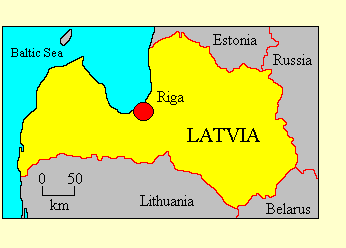

REPUBLIC OF LATVIA
• Official name: Latvijas Republika (Republic of Latvia)
• Location: Eastern Europe
• International organisations: Council of Europe, European Union, North Atlantic Treaty Organisation, Organisation for Security and Co-operation in Europe,
United Nations, World Trade Organisation
• Borders: Belarus, Estonia, Lithuania, Russia
• Coastline: Baltic Sea
• Land area: 64,589 Km2
• Population: 2,200,000
• Annual GDP (PPP) per capita: US$14,500 (2009 CIA estimate). World ranking: 61
• Ethnicity: Latvian 59.3%, Russian 27.8%, Belarusian 3.6%, Ukrainian 2.5%, Polish 2.4%, Lithuanian 1.3%
• Languages: Latvian is the official language and is vigorously promoted by the
government, but it is the first language of only about 60% of the population. Russian is spoken
by 28%, and small minorities speak Belarusian, Estonian, Lithuanian, Polish, Tatar, Ukrainian
and Yiddish.
• Religion: Most of the ethnic Latvian population are nominal Protestant Christians, although religious
practice is very low. The ethnic Russians are nominal Orthodox Christians. There are small Catholic and Jewish
minorities.
• Form of government: Parliamentary democratic republic. Latvia's counties were abolished in 2009. Latvia is now
divided into nine cities and 109 municipalities.
• Capital: Riga
• Constitution: The
Constitution of the Republic of Latvia, which came into effect in 1922, was suspended
from 1940 until 21 August 1991, when it was revived in an amended form.
• Head of state: The President, chosen by the legislature for a
four-year term. President Andris Berzins took office
on 8 July 2011.
• Head of government: The Prime Minister, appointed by the President. The
Prime Minister is the leader of the largest party in the legislature and
is accountable to it.
• Legislature: Latvia has a unicameral legislature, the
Parliament (Saeima), which has 100 members elected
for four-year terms by proportional representation.
• Electoral authority: The Central Election Commission of Latvia administers national elections
• Freedom House 2009 rating: Political Rights 2, Civil Liberties 2
• Transparency International Corruption Index: 43% (59 of 178 countries rated)
• Reporters Without Borders Press Freedom 2010 Index: 91.5% (30 of 178 countries rated)
• Heritage Foundation Economic Freedom 2010 Index: 65.8% (56 of 178 countries rated)

Political history
The Latvian or Lettish-speaking lands were fought over by the Teutonic Knights, the
Russians, Poles, Swedes and Lithuanians until 1558, when they were incorporated into the
Kingdom of Poland. In 1793 Poland was partitioned by its neighbours and Latvia came under
Russian rule. When the Russian Empire collaped in 1918, Latvia became an independent
state, although not recognised until 1922.
At first a liberal democracy, Latvia became a
dictatorship under Karlis Ulmanis in 1934. In 1940, under the secret clauses of the
Nazi-Soviet pact, Latvia was forced to accept Soviet occupation, and incorporation into the
Soviet Union soon followed. Latvia was occupied by Nazi Germany 1941-45, then returned
to Soviet rule until 1991, when it declared its resumption of independence on the collapse
of Soviet power.
Latvia's main problem since independence has been the presence of a large Russian
minority, many of whom are not citizens and cannot gain citizenship since they are not fluent in Latvian. A campaign of vigorous
Latvianisation followed independence, but Latvia's
desire to join the European Union has forced it to accept greater respect for minority
rights. There has been considerable Russiam emigration since independence. Latvia joined both the EU and NATO in 2004.
The dominant political party until 2011 was the centrist
Unity party of Prime Minister
Valdis Dombrovskis, who has held office since the
resignation of Ivars Godmanis in March 2009. Its
main rivals were the the conservative People's Party and the liberal Harmony Centre.
Other parties include the Union of Greens and Farmers, a
coalition between the Latvian Green Party and the Latvian Farmers' Union. At early elections in September 2011,
Dombrovskis's coalition was
defeated, with the Harmony Centre emerging as the largest party, followed by the new
Reform Party of former president Valdis Zatlers.
Freedom House's 2011 report on Latvia
says: "Latvia is an electoral democracy... The Organization for Security and Cooperation in Europe (OSCE) found that the
October 2010 parliamentary elections met all international standards, though it expressed concern that nearly 17 percent
of residents of voting age could not participate, as they were noncitizens... Latvia's efforts to combat corruption were
hampered in 2010 by internal divisions at the KNAB... The government generally respects freedom of the press. Private television and
radio stations broadcast programs in both Latvian and Russian... Freedoms of assembly and association are protected by law and
in practice... While judicial independence is generally respected, inefficiency, politicization, and corruption continue to be
problems."
Updated November 2011
|
